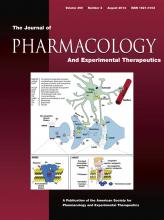Abstract
Complementary genetic and pharmacological approaches to inhibit monoacylglycerol lipase (MAGL) and fatty acid amide hydrolase (FAAH), the primary hydrolytic enzymes of the respective endogenous cannabinoids 2-arachidonoylglycerol (2-AG) and N-arachidonoylethanolamine, enable the exploration of potential therapeutic applications and physiologic roles of these enzymes. Complete and simultaneous inhibition of both FAAH and MAGL produces greatly enhanced cannabimimetic responses, including increased antinociception, and other cannabimimetic effects, far beyond those seen with inhibition of either enzyme alone. While cannabinoid receptor type 1 (CB1) function is maintained following chronic FAAH inactivation, prolonged excessive elevation of brain 2-AG levels, via MAGL inhibition, elicits both behavioral and molecular signs of cannabinoid tolerance and dependence. Here, we evaluated the consequences of a high dose of the MAGL inhibitor JZL184 [4-nitrophenyl 4-(dibenzo[d][1,3]dioxol-5-yl(hydroxy)methyl)piperidine-1-carboxylate; 40 mg/kg] given acutely or for 6 days in FAAH(−/−) and (+/+) mice. While acute administration of JZL184 to FAAH(−/−) mice enhanced the magnitude of a subset of cannabimimetic responses, repeated JZL184 treatment led to tolerance to its antinociceptive effects, cross-tolerance to the pharmacological effects of Δ9-tetrahydrocannabinol, decreases in CB1 receptor agonist–stimulated guanosine 5′-O-(3-[35S]thio)triphosphate binding, and dependence as indicated by rimonabant-precipitated withdrawal behaviors, regardless of genotype. Together, these data suggest that simultaneous elevation of both endocannabinoids elicits enhanced cannabimimetic activity but MAGL inhibition drives CB1 receptor functional tolerance and cannabinoid dependence.
Footnotes
- Received January 8, 2014.
- Accepted May 20, 2014.
This work was supported by the National Institutes of Health National Institute on Drug Abuse [Grants T32-DA007027, F31-DA026279, F31-DA028333, P01-DA009789, P01-DA017259, P30-DA033934, R01-DA015197, and R01-DA032933]; and a Toni Rosenberg Fellowship.
- Copyright © 2014 by The American Society for Pharmacology and Experimental Therapeutics
JPET articles become freely available 12 months after publication, and remain freely available for 5 years.Non-open access articles that fall outside this five year window are available only to institutional subscribers and current ASPET members, or through the article purchase feature at the bottom of the page.
|






